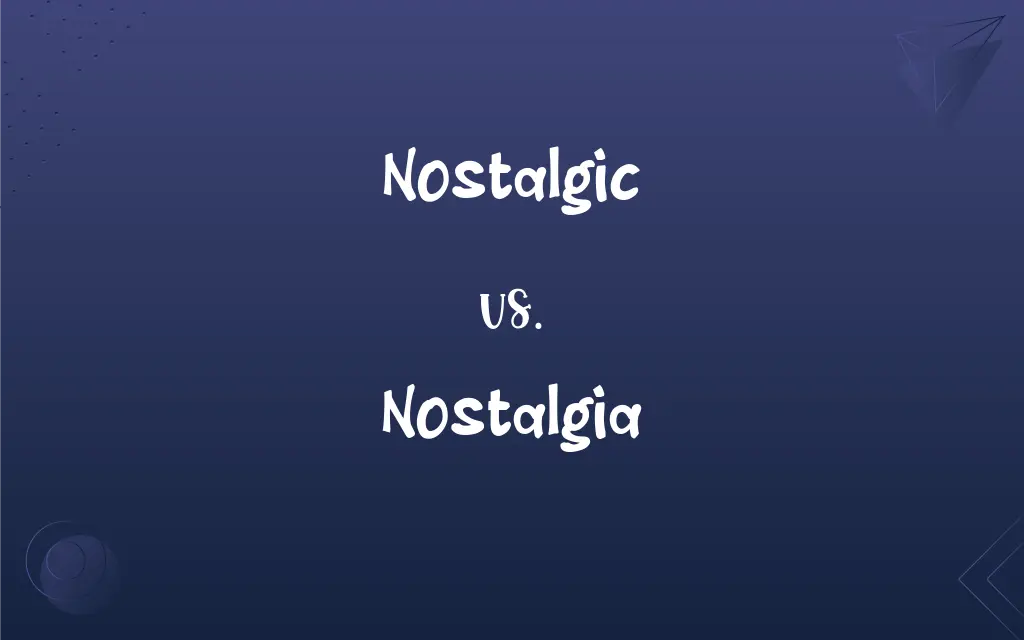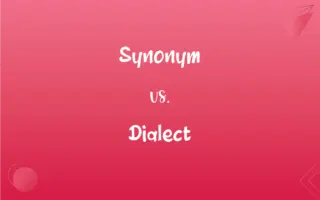Nostalgic vs. Nostalgia: What's the Difference?
Edited by Harlon Moss || By Janet White || Updated on October 23, 2023
"Nostalgic" is an adjective describing wistful affection for the past; "Nostalgia" is a noun for the sentiment itself.

Key Differences
"Nostalgic" and "Nostalgia" serve different grammatical functions but are closely related in meaning. "Nostalgic" is an adjective used to describe feelings, moments, or items inducing or demonstrating a longing for the past. On the other hand, "Nostalgia" is a noun, referring to the sentimental longing or wistful affection for the past, typically for a period or place with happy personal associations. Both terms encapsulate the emotion of longing for the past but are used in different contexts grammatically.
In literature and conversation, "Nostalgic" is utilized to characterize moments, experiences, or sentiments that evoke a yearning for the past. "Nostalgia," however, stands for the feeling itself, the emotion that one experiences when they are reminiscing. While "Nostalgic" qualifies something as being able to induce nostalgia, "Nostalgia" is the concept or emotion one is referring to or experiencing.
When discussing emotions or moods, "Nostalgic" is used to describe the state of experiencing nostalgia. For example, a person can feel "Nostalgic" when they hear a song from their childhood. "Nostalgia" is the term for the emotional state they are experiencing, a kind of longing mixed with affection for a past period or place. So, while "Nostalgic" describes the condition of having nostalgia, "Nostalgia" is the condition itself.
In therapeutic or psychological contexts, "Nostalgic" can describe a therapeutic approach or moment where individuals are encouraged to revisit memories. In contrast, "Nostalgia" refers to the therapeutic use of these fond memories to create positive feelings or mental states. Thus, a therapist might encourage a "Nostalgic" reflection, inducing "Nostalgia" for mental health benefits.
Lastly, in everyday usage, "Nostalgic" and "Nostalgia" often go hand in hand. Objects or music might be described as "Nostalgic" if they cause someone to reminisce about the past. Simultaneously, the feeling that ensues upon this reminiscence is called "Nostalgia." Therefore, "Nostalgic" often describes triggers, while "Nostalgia" is the emotional response.
ADVERTISEMENT
Comparison Chart
Grammatical Type
Adjective
Noun
Definition
Inducing or showing a longing for the past
A sentimental longing for the past
Usage in Sentence
Describes a person, item, or situation
Stands as a subject or object
Emotional Connotation
Pertains to the feeling of nostalgia
Represents the emotion itself
Contextual Application
Used for things that evoke nostalgia
Used for the state of feeling nostalgic
ADVERTISEMENT
Nostalgic and Nostalgia Definitions
Nostalgic
Nostalgic means experiencing a sentimental or wistful yearning for the past.
Hearing that song made me feel Nostalgic.
Nostalgia
Nostalgia refers to the longing for a past time or state.
Nostalgia washed over him as he revisited his hometown.
Nostalgic
Nostalgic pertains to having a longing for past experiences.
She felt Nostalgic at the sight of her old school.
Nostalgia
Nostalgia is a sentimental longing or wistful affection for the past.
Looking through old photos filled her with Nostalgia.
Nostalgic
Nostalgic describes something that evokes nostalgia.
The Nostalgic movie brought back childhood memories.
Nostalgia
Nostalgia signifies a desire to return to past periods or experiences.
The scent of apple pie sparked Nostalgia for her grandmother's kitchen.
Nostalgic
Nostalgic is relating to or reminiscent of a past time or condition.
The vintage decor gave the room a Nostalgic feel.
Nostalgia
Nostalgia is the emotional state of missing the past.
Nostalgia often colors our memories more positively.
Nostalgic
Nostalgic signifies an emotional state of longing for the past.
The reunion made them Nostalgic for their college days.
Nostalgia
Nostalgia is an affectionate feeling of remembering past events or times.
Holiday traditions are steeped in Nostalgia.
Nostalgic
A bittersweet longing for things, persons, or situations of the past.
Nostalgia
A bittersweet longing for things, persons, or situations of the past.
Nostalgic
The condition of being homesick; homesickness.
Nostalgia
The condition of being homesick; homesickness.
Nostalgic
Of, having, or relating to nostalgia.
Nostalgia
A longing for home or familiar surroundings; homesickness.
Nostalgic
A person who displays nostalgia for something.
Nostalgia
(transferred sense) A bittersweet yearning for the things of the past.
Nostalgic
Of or pertaining to nostalgia; affected with nostalgia.
Nostalgia
Homesickness; esp., a severe and sometimes fatal form of melancholia, due to homesickness.
Nostalgic
Unhappy at being away and longing for familiar things or persons
Nostalgia
A sentimental yearning to return to an earlier time remembered as happier or more pleasant, or a former place evoking happy memories; a longing to experience again a former happy time; as, a nostalgia for the brotherhood of the Woodstock music festival; a nostalgia for the comradeship of one's college friends.
Nostalgia
Longing for something past
FAQs
Are Nostalgic and Nostalgia the same?
They convey related concepts; "Nostalgic" is an adjective, and "Nostalgia" is a noun.
Is Nostalgic always related to positive feelings?
Mostly, but it can also involve a bittersweet longing for the past.
Can Nostalgia be experienced for a time one hasn't lived?
Yes, it's called "anemoia" or "nostalgia for a time you've never known."
Is being Nostalgic a sign of aging?
Not necessarily; it's a common human emotion experienced at any age.
Can something be described as Nostalgia?
No, "Nostalgia" is a feeling; things evoke or induce it and are described as "Nostalgic."
How does one use Nostalgic in a sentence?
As an adjective, e.g., "The old photos made her Nostalgic."
Is there a negative form of Nostalgic or Nostalgia?
Not specifically, though the context can make the sentiment negative.
Can Nostalgia affect one's mood?
Yes, it can create feelings of happiness, sadness, or longing.
Why do certain smells or songs make us Nostalgic?
They're often associated with past memories or experiences.
Can Nostalgia be used to describe future events?
No, Nostalgia refers specifically to past events or times.
Can places be Nostalgic?
Places can't feel emotions but can induce Nostalgic feelings in people.
Is there a way to combat overwhelming Nostalgia?
Focusing on creating new, positive experiences can be helpful.
Do Nostalgic and Nostalgia have the same root?
Yes, both originate from the Greek word "nostos," meaning return home.
About Author
Written by
Janet WhiteJanet White has been an esteemed writer and blogger for Difference Wiki. Holding a Master's degree in Science and Medical Journalism from the prestigious Boston University, she has consistently demonstrated her expertise and passion for her field. When she's not immersed in her work, Janet relishes her time exercising, delving into a good book, and cherishing moments with friends and family.
Edited by
Harlon MossHarlon is a seasoned quality moderator and accomplished content writer for Difference Wiki. An alumnus of the prestigious University of California, he earned his degree in Computer Science. Leveraging his academic background, Harlon brings a meticulous and informed perspective to his work, ensuring content accuracy and excellence.































































